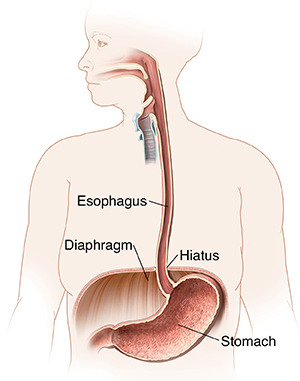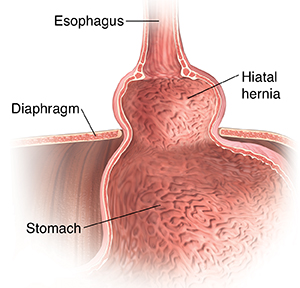When the area where the stomach and esophagus meet bulges up through the diaphragm into the chest cavity, it's called a hiatal hernia. In some cases, part of the stomach may bulge above the diaphragm. Stomach acid may move up into the esophagus and cause symptoms. The symptoms are often blamed on GERD (gastroesophageal reflux disease). You may only know about the hernia when it shows up on an X-ray taken for other reasons or during an evaluation of your upper gastrointestinal tract.
What you may feel
The hiatus is a normal hole in the diaphragm. The esophagus passes through this hole and leads to the stomach. In some cases, part of the stomach may bulge above the diaphragm. This bulge is called a hernia. Stomach acid may move up into the esophagus and cause symptoms.
When you eat, the muscle at the hiatus relaxes to let food pass into the stomach. It tightens again to keep food and digestive acids in the stomach.
Many people with a hiatal hernia have mild symptoms. You may notice these GERD symptoms:
-
Heartburn or other chest discomfort.
-
A feeling of chest fullness after a meal.
-
Frequent burping.
-
Acid taste in the mouth.
-
Trouble swallowing.
-
Regurgitation. (Food or liquid comes back up from the stomach).
Treating symptoms
If you have been diagnosed with a hiatal hernia, these tips may help ease symptoms:
-
Lose excess weight. Extra weight puts pressure on the stomach and esophagus.
-
Don’t lie down after eating. Sit up for at least an hour after you eat. Lying down after eating can increase symptoms.
-
Avoid certain foods and drinks. These include fatty foods, chocolate, coffee, mint, caffeine, and other foods that cause symptoms for you.
-
Don’t smoke or drink alcohol. These can make symptoms worse.
-
Look at your medicines. Discuss your medicines with your health care provider. Many medicines can cause symptoms.
-
Consider an antacid medicine. Ask your provider about over-the-counter and prescription medicines that may help.
-
Ask about surgery, if needed. Surgery is a treatment choice for some people. Your health care provider can help you decide if surgery is right for you.



